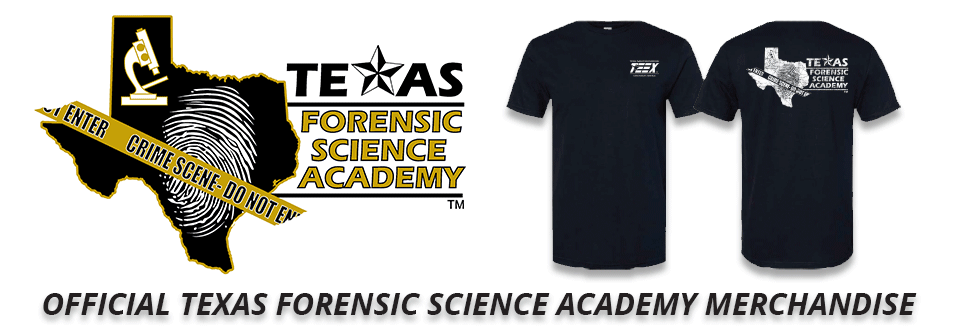Forensic Investigator I
Required Courses
- Foundations of Forensic Photography
- Forensic Photography I
- Foundations of Courtroom Testimony
- Courtroom Testimony Practical Applications
- Basic Criminal Investigation (Classroom or Online)
- Pick one of the following options:
Once all TEEX courses have been completed, applicants should confirm they meet all certificate requirements using the Forensic Investigator I Application and return it to the TEEX Law Enforcement & Protective Services division. Eligibility of each candidate will be reviewed and email notification of decision will be sent.
Effective September 1, 2024, the unit price fee for the standard certificate will increase from $37 to $50. This fee change will apply for all applications received on or after this date.
Note: All courses must be taken within seven (7) years of the date of the application. Only one course from another training provider will be accepted if the curriculum and hours match TEEX curriculum. To submit training for TEEX course equivalency review/consideration, please submit the following:
- Copy of the course syllabus
- Copy of the certificate of completion
- Details of the training event
- Dates of training
- Format of training (in person, online, webinar, other)
TEEX’s approval decision is based on equivalency of course content, activities, and duration. TEEX will review your course equivalency request and make a determination on a case-by-case basis; additional information may be required from you.
Upon successful completion of the Forensic Investigator I Certificate, continue your education with the Forensic Investigator Level II Certificate.

Texas Forensic Science Academy is now selling t-shirts! Order yours at the following link: bit.ly/teexstore

| Category | Course # | Course Title | Description | Funding Options & Delivery Types | Division | Learn More Buttons |
|---|---|---|---|---|---|
| Forensic Investigator I | FSA101 | Forensic Photography I |
Capturing evidence and documenting the crime scene through skilled photography techniques is crucial to a proper criminal investigation. This course will address the basic concepts of photography and their application to professional crime scene documentation. Course instruction will be…
Show more |
Face-to-Face | Learn More about Forensic Photography I |
| Forensic Investigator I | FSA104 | Latent Print Processing |
Even with the advent of DNA and other forensic technologies, fingerprints continue to be one of the single most important methods for biometric identification and criminal investigation. During this course, participants will receive information and learn techniques and methods for processing…
Show more |
Face-to-Face | Learn More about Latent Print Processing |
| Forensic Investigator I | FSA105 | Basic Criminal Investigation |
This course prepares participants for their transition from a traditional patrol/traffic function to an investigative position, such as a detective. The Basic Criminal Investigation course is also appropriate for those agencies that require officers to perform both patrol and investigative…
Show more |
Face-to-Face | Learn More about Basic Criminal Investigation |
| Forensic Investigator I | FSA106 | Crime Scene Investigation |
Proper crime scene investigation, evidence collection, and documentation are key components to any criminal investigation. This course provides participants with information, techniques, and methods for conducting investigations ranging from general crime scene investigations to death…
Show more |
Face-to-Face | Learn More about Crime Scene Investigation |
| Forensic Investigator I | FSA113 | Basic Criminal Investigation (Online) |
This online course prepares participants for their transition from a traditional patrol/traffic function to an investigative position, such as a detective. The Basic Criminal Investigation course is also appropriate for those agencies that require officers to perform both patrol and…
Show more |
Online | Learn More about Basic Criminal Investigation (Online) |
| Forensic Investigator I | FSA116 | Foundations of Forensic Photography |
Photography is a critical element in the documentation of criminal investigations. This online course addresses the basic concepts of photography and their application to professional investigative documentation. For the final project, participants have the opportunity to capture photographs…
Show more |
Online | Learn More about Foundations of Forensic Photography |
| Forensic Investigator I | FSA118 | Foundations of Courtroom Testimony |
Those who conduct investigations or deal with evidence are expected to testify as expert witnesses. This means they must establish credibility the moment they enter the courtroom and proceed to the witness stand to present their testimony. This online course provides participants with an…
Show more |
Online | Learn More about Foundations of Courtroom Testimony |
| Forensic Investigator I | FSA119 | Courtroom Testimony Practical Applications |
Crime scene investigators and peace officers are expected to be expert witnesses. To be perceived as experts, they must establish credibility from the moment they enter the courtroom and proceed to the witness stand to present their testimony. This course provides participants with practical…
Show more |
Face-to-Face | Learn More about Courtroom Testimony Practical Applications |
